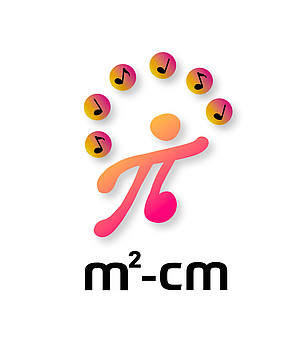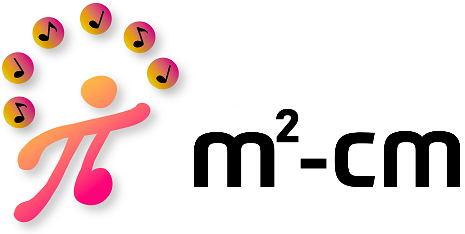Maths through Music and Creative Movement

The integration of Arts in STEM (Science, Technology and Engineering and Maths) education is one of the main objectives of the European Union. Furthermore, most European schools are multicultural with students from diverse cultural, socio-economic and religious backgrounds. Consequently alternative approaches are being adopted to motivate and engage students towards a more inclusive education. Both Arts integration in STEM and multicultural engagement are an important innovative of the M2-Cm project. A third important innovation is to employ music and creative movement to confront Maths phobia that a lot of students (and also adults) experience. ”Math Phobia may be a feeling of tension, apprehension, or fear that interferes with math performance. An individual with math phobia doesn’t necessarily lack ability in mathematics; rather, s/he can’t perform to her/his full potential thanks to the interfering symptoms of anxiety..”
Among the suggested methods that can be used as remedy for the Maths Phobia is to be shown to children that math is a creative subject. Learning math is very much like learning music or art! Thus, the integration of Music and Creative Movement into Maths learning procedure brings more fun and interaction among students and teachers that leads to positive academic results.
In Viksjöforsbaletten for more than a decade the local dance teachers have supported learning curricular subjects with cultural expressions in the dance school. AMusEd is an organization that gives special emphasis in the importance of integrating music in curriculum subjects. Both organizations acknowledge the importance of integrating arts into curriculum subjects, and they have experienced first hand the positive effects of it on students’ wellbeing and academic results.
Music and Creative Movement are inseparable and they directly connect with the embodied cognition philosophy, since through Creative Movement and Music we can help learners receive and gain new knowledge through their engagement of their whole body (embodied cognition). TUC/MUSIC as a technological University gives special attention in the development of STEAM competencies in young people, that will help them not only during their student life but also in their future life as adults for that it participated in several Erasmus+ projects and focuses on innovative pedagogical approaches integrating Arts and promoting STEAM in European Schools.
Mavromataki Private school is also focusing on the STEAM approach and more specifically in the connection of Maths with the other school subjects since Maths is a foundation in all professions and activities in people’s lives.
All involved partners bring a different expertise in this project and they all have special interest in promoting the STEAM approach, elements that will bring added value to the implementation of M2-Cm project. We strongly believe that the Production of Project Results will help teachers to gain new knowledge that will improve their teaching skills in STEAM approach and the students, who are the final beneficiaries, will be introduced to a more effective way of learning Maths.
Through this project we aim to achieve the following:
- Enhance STEAM pedagogical competences in the field of integrating arts in mathematics;
- Enhance skills and efficacy in music and creative movement;
- Adopt innovative teaching methods by embracing the effective use of music and movement techniques;
- Increase students' motivation and engagement in the learning process, fostering creativity and critical thinking through a more experiential approach of learning;
- Create a positive classroom environment, by enhancing team building and collaboration that contribute to learners' wellbeing;
- Increase awareness of the effective integration of music and creative movement in Maths across Europe.
The specific project results to be produced are:
- Teachers Guide. This guide includes research done that proves the relevance and the importance of music and creative movement in Maths within the overarching framework of STEAM teaching and learning. Further, it transfers to the teachers the general theoretical knowledge of Music and Movement that matches the Mathematical concepts as well as the historical and intercultural connections of these three subjects. The Teacher Guide is offered in English, Swedish and Greek.
- Repository of activities and other useful sources for the teachers. Examples of activities that can be directly implemented in real classrooms, step by step guides on how to create a song that brings an added value to the class, sources where teachers can find similar examples from all over the world as well as a repository of world music/dance that can be connected to mathematical concepts and examples that can be used for the purpose of enhancing the integration of arts in Maths. The activities in the repository are offered in English and, whenever possible and necessary, in Swedish and/or Greek.
- Online Networking and e-learning Platform. The aim is to bring and network teachers across Europe in order to enable them to exchange ideas and practices in Maths teaching and give them the opportunity to be educated in an online environment and see a lot of examples of activities in real classrooms.
Apart from the planned Project Results that are tangible, some intangible outcomes are achieved through M2- Cm. These outcomes are:
- Expansion of the partners’ knowledge as it concerns didactic methods applied in Maths.
- Improvement of management skills in European projects and possibility for future collaborations.
- Increased motivation of students to learn.
- Increased intercultural awareness. Through music examples participants will have the opportunity to learn about others’ countries' music culture.
- Contribution to the professional development of participating educators.
- Help students to cross barriers. Students who are not familiar with Music or Movement (dance) are given a route into these Arts or students who are shy with Maths will find a new way to experience it.
- Improvement of students' reaction towards Maths subject.
